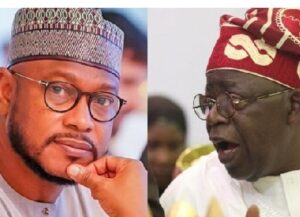Tensions Escalate in Zamfara as Governor Lawal Accused of Confronting Tinubu
Tensions Escalate in Zamfara as Governor Lawal Accused of Confronting Tinubu

Mounting political tensions and deteriorating security conditions in Zamfara have sparked renewed demands for President Bola Tinubu to impose a state of emergency in the troubled northwestern state. The crisis, fueled by an ongoing rift between Governor Dauda Lawal and members of the state House of Assembly, has drawn accusations that the governor is actively resisting federal intervention.
Allegations have emerged claiming that Governor Lawal is mobilizing resources to fend off pressure from Abuja. According to a statement issued on Sunday, May 4, 2025, by Alhaji Ibrahim Shehu Gwandu, president of the Northern Patriots for Justice and Democracy (NPJD), the governor allegedly diverted ₦10 billion from local government coffers to finance a media campaign designed to project an image of stability and deflect scrutiny from the presidency.
The NPJD asserts that the campaign is both domestic and international in scope, involving surrogate groups and strategic messaging aimed at countering calls for emergency rule, while masking the growing crisis in the state.
Calls to follow a similar approach taken in Rivers State have intensified, with observers urging the president to take decisive action. Meanwhile, armed violence continues to plague Zamfara’s local government areas, displacing residents and deepening the humanitarian emergency. Political fractures have also emerged, with a faction of suspended lawmakers establishing a breakaway assembly, effectively splitting legislative authority in the state.
“We have reliable intelligence indicating that Governor Lawal has siphoned billions from local funds to orchestrate a public relations blitz, mislead the international community, and suppress federal intervention,” Gwandu stated.
The group claims the fund is being used not just to promote the governor’s image, but also to orchestrate attacks against political opponents, including former Governor and current Minister of State for Defence, Bello Matawalle. NPJD alleges that phantom civil society organizations are being used to file fabricated corruption petitions against Matawalle in an effort to tarnish his reputation and weaken his influence.
“These campaigns are less about accountability and more about settling political scores,” Gwandu continued. “Matawalle’s proximity to President Tinubu and his strong stance on national security have made him a target.”
According to the group, the governor’s strategy includes manipulating public opinion to shift blame for economic hardship onto the federal government, while glossing over alleged mismanagement at the state level.
“The governor’s allies are attempting to frame Tinubu as the root cause of the country’s economic pain,” said Gwandu. “But the truth is that Lawal has failed to deliver meaningful progress in nearly two years and is now using propaganda to cover up that failure.”
NPJD argues that these actions amount to a direct challenge to federal authority and warn that continued defiance could have serious consequences.
“It is reckless for any governor to politicize a national security issue while citizens are being killed and displaced. The state cannot afford a leadership that places personal political ambition above the safety of its people,” Gwandu said.
The group condemned what it described as a misuse of public funds to influence media narratives, calling it a blatant abuse of power. Gwandu added that the NPJD has filed formal complaints with the EFCC and ICPC regarding the alleged financial misconduct.
“If there is no accountability, we will take to the streets,” he warned. “We’re ready to organize peaceful demonstrations across the north to demand justice and transparency. Zamfara is not anyone’s private estate.”
He also urged President Tinubu not to be swayed by what he called staged portrayals of calm and to take decisive action to restore law and order.
“This is about national security, not politics,” said Gwandu. “The president must act in the best interests of the country and ensure that the rule of law prevails in Zamfara.”
Community leaders, religious figures, and traditional rulers were also urged to break their silence and help preserve the democratic process in the state.
“Zamfara is suffering. Now is the time for bold leadership—not silence,” Gwandu concluded.
As the federal government weighs its response, the unfolding events in Zamfara may become a critical test of constitutional limits, state accountability, and the balance of power in Nigeria’s democracy.
TRENDING SONGS
 Shock in Anambra: Bride Disappears Moments Before Wedding
Shock in Anambra: Bride Disappears Moments Before Wedding
 Nigerian Woman Returns ₦330 Million Accidentally Credited to Her Account
Nigerian Woman Returns ₦330 Million Accidentally Credited to Her Account
 APC Don Reach Morocco?’ VeryDarkMan Reacts to Seyi Tinubu Poster
APC Don Reach Morocco?’ VeryDarkMan Reacts to Seyi Tinubu Poster
 Bride Breaks Down in Tears as Wedding Meals Were Kept Secretly While Guests Go Home Hungry
Bride Breaks Down in Tears as Wedding Meals Were Kept Secretly While Guests Go Home Hungry
 Odogwu by Day, Robber by Night: How Marriage Joy Turned Into Tragedy
Odogwu by Day, Robber by Night: How Marriage Joy Turned Into Tragedy
 Nigerian Officials Allegedly Pocket N4–6B Weekly Through Smuggling Cartels at Seme–Badagry Border
Nigerian Officials Allegedly Pocket N4–6B Weekly Through Smuggling Cartels at Seme–Badagry Border
 Ahmad Yerima: Naval Officer to Face No Sanctions After Clash with Wike – Matawalle
Ahmad Yerima: Naval Officer to Face No Sanctions After Clash with Wike – Matawalle
 Trending Video: Muslim Man Joins Wife in Hallelujah Challenge ‘Dress Like Your Miracle’ Night
Trending Video: Muslim Man Joins Wife in Hallelujah Challenge ‘Dress Like Your Miracle’ Night
 Woman Seeks Advice as Late Brother’s Wife Refuses to Mourn Him Following His Death With Alleged Mistress
Woman Seeks Advice as Late Brother’s Wife Refuses to Mourn Him Following His Death With Alleged Mistress
 Nobody Cares About Fine Girls In The UK, I Miss Nigeria — Nigerian Lady Laments
Nobody Cares About Fine Girls In The UK, I Miss Nigeria — Nigerian Lady Laments
Share this post with your friends on ![]()













